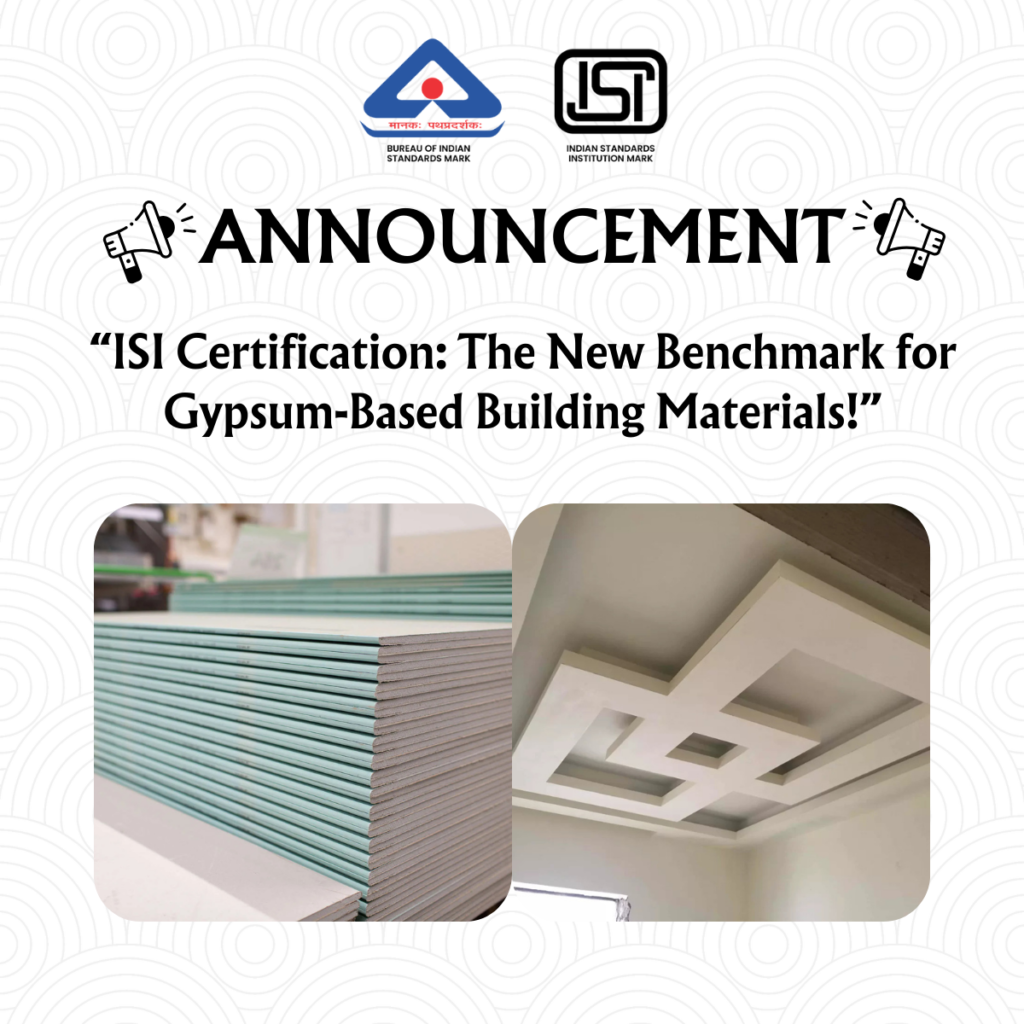Silvereye Certifications - your authoritative pathway to achieving and maintaining industry compliance with precision and trust.
UNDERSTANDING THE NEW AMENDMENT OF THE GYPSUM BASED BUILDING MATERIAL.

Here is a detailed explanation of the Gypsum based Building Materials (Quality Control) Amendment Order, 2024, including its implications, rationale, and requirements:
TITLE AND APPLICABILITY
The amendment is now formally named as the Gypsum based Building Materials (Quality Control) Amendment Order, 2024 and comes into effect immediately upon its publication in the Official Gazette. This ensure there is no ambiguity about the start date, making it clear when stakeholders need to comply with the updated regulations.
KEY AMENDMENTS AND PROVISION
- EXEMPTION FOR EXISTING STOCK
The amendment introduces a provisional exemption for certain goods already in circulation or under the process of certification at the time the amendment takes effect.
- WHO IS ELIGIBLE FOR THIS EXEMPTION:
Domestic manufacturers who have been certified by the BIS (Bureau of Indian Standard) or have already applied for BIS certification. Importers of the gypsum-based building materials, provided they should meet the same certification or the application criteria for it.
- CONDITION FOR THE EXEMPTION:
All the goods that are manufacturer or are imported before the date of the commencement of the amended order are eligible. The exemption is time-bound, allowing these goods to be sold, displayed, or offered for sale for a period of six months from the date of the amendment’s notification. The manufacturer or importer must declare the stock they have to the central government. This declaration must be certified by a charted accountant and explicit about the stock’s quantity and compliance with all the necessary regulatory applicable standards.
- RATIONALE:
This provides the business with a transition period to clear their existing stock without immediate financial burden. Ensure that non-compliant goods do not enter the market post the stipulated six months, aligning with the quantity standards.
- SPECIAL PROVISIONS FOR RESEARCH AND DEVELOPMENT (R&D)
The amendment recognizes the need for R&D activities, which often require small quantities of materials under flexible conditions.
2. SCOPE OF EXEMPTION:
200 pieces per year of specific-sized goods or article can be imported by manufacturers for the research and development purpose. These items are not subject to the same quality control requirements applicable to the commercial goods.
- CONDITIONS FOR THE EXEMPTION:
The goods imported by the manufacturer must be solely used for the research and development and cannot be sold commercially into the market. After the use of the goods the goods must be disposed of as scrap to prevent them from entering the commercial market. Manufacturers must maintain detailed financial year-wise records of these items, ensuring the transparency and accountability. Records must be furnished to the central government on official letterhead, signed by an authorized signatory.
- RATIONALE:
Encourages innovation by allowing access to specialized material for testing and development. Mitigates potential misuse of the exemption by imposing strict record-keeping and disposal requirements.
BROADER IMPLICATION OF THE AMENDMENT
- FOR MANUFACTURERS AND IMPORTERS:
It provides a clear compliance pathway for existing and newly produced/imported goods. Avoids immediate disruption of the business operations by allowing a six-month transition for uncertified stock.
- FOR THE GOVERNMENT:
Enhances public safety by ensuring that all the gypsum-based building materials in the market meets the BIS quality standards. Strengthens monitoring by requiring the declaration and certified documentation from manufacturers and importers. Establishes accountability for R&D exemptions through mandatory reporting and scrapping protocols.
- FOR CONSUMERS:
Ensure access to higher-quality and safer building materials, fostering trust in the marketplace. Prevent the circulation of uncertified or substandard goods post the six-month deadline.
STRATEGIC IMPORTANCE OF THE AMENDMENT
The amendment reflects the government’s dual focus on public safety and economic adaptability:
- By imposing stricter quality controls, the government aligns with its broader agenda of improving infrastructure safety.
- The exemptions for pre-existing stock and R&D facilitates ease of doing business, balancing regulatory demands with the industry needs.
- The integration of BIS certification emphasizes the government’s commitment to uniform standards across the sector.
CONCLUSION
The Gypsum based Building Materials (Quality Control) Amendment Order, 2024, is a proactive measure to enhance quality assurance while minimizing disruption to manufacturers and importers. The provisions for stock clearance, combined with strict deadlines and documentation requirements, ensure market stability during the transition.
The R&D allowance acknowledges the importance of innovation, providing flexibility for manufacturers while safeguarding against commercial misuse.
This amendment sets a precedent for implementing quality control in a phased manner, balancing regulation with industry practicality. Let me know if you would like assistance in drafting compliance plans, declarations, or other related documentation!
For comprehensive insights and additional resources on this topic, we invite you to explore our website.https://seyecs.com/.
Copyright Notice
All content on this blog, including text, images, and graphics, is the property of Silvereye Certifications and Consulting Services Pvt. Ltd. and is protected by copyright laws. Unauthorized reproduction, distribution, or use of this material without written permission is prohibited and may result in legal action. If you wish to share or reference our content, please credit Silvereye Certifications and Consulting Services Pvt. Ltd. with a link to the original post. Thank you for respecting our intellectual property rights.
Enquiry Now!!
- Get in touch, and expect a call from us within 30 minutes.

